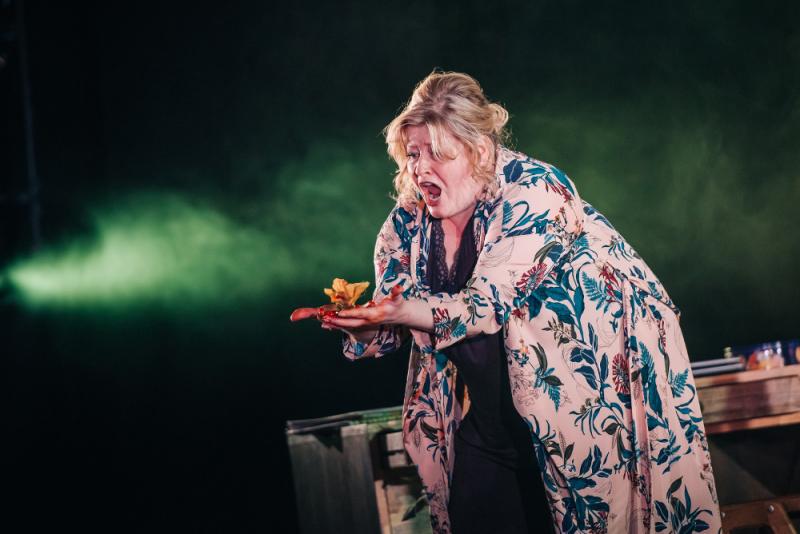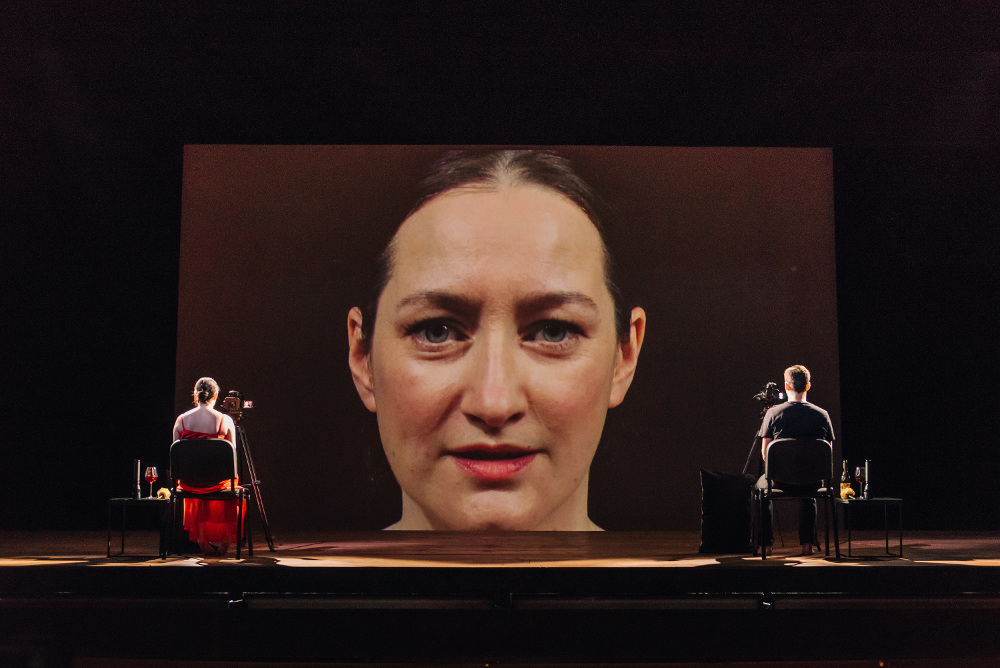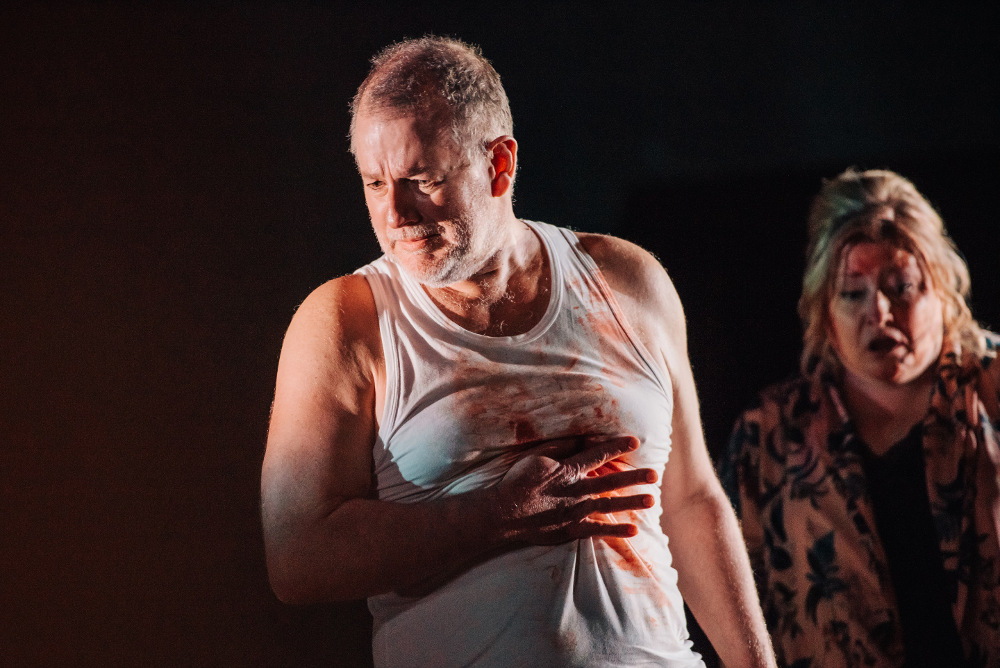Bluebeard's Castle & The 8th Door, Scottish Opera | reviews, news & interviews
Bluebeard's Castle & The 8th Door, Scottish Opera
Bluebeard's Castle & The 8th Door, Scottish Opera
A provocative premiere shines revealing new light on Bartók's dark opera masterpiece

What to pair with Bluebeard’s Castle? It’s always a dilemma for opera companies. Something lightweight, even comic, provides contrast but also risks trivialising Bartók’s dark, symbolist drama. Something equally brooding risks submerging the audience into an evening of endless gloom.
The work in question is The 8th Door, created jointly by Scottish Opera’s composer in residence Lliam Paterson and Vanishing Point’s artistic director Matthew Lenton. And the combined result is an engrossing, often challenging evening that casts Bartók’s opera in a new and unusual light, and provides a provocative new context for its elusive symbolism.
It’s hard to describe what The 8th Door actually is – maybe simply a 40-minute cantata by Paterson played and sung in the pit, while a staging by Lenton takes place up top. Certainly there are moments when those two worlds feel unconnected, simply happening to unfold at the same time. Yet at others they’re carefully choreographed together, the smallest actions finding parallels in Paterson’s music. It’s a beguiling effect.
 Paterson’s score, for five amplified voices and a large orchestra heavy on percussion, perhaps inevitably sounds a lot like Berio at times, especially his Sinfonia, and there are clear nods to Andriessen, Adams and others, too. But it’s a glittering, engrossing creation, sometimes frustrating in its swelling textures that simply dissipate, but thoroughly effective in its gradual transition from settings of love poems in English to a harsher-sounding Hungarian, leading us inexorably towards the dark psychodrama of Bartók’s opera after the interval. There might be a sense that Paterson – still only in his mid-20s – is still finding his individual voice, but there’s no doubting the strength and overall originality of his concept.
Paterson’s score, for five amplified voices and a large orchestra heavy on percussion, perhaps inevitably sounds a lot like Berio at times, especially his Sinfonia, and there are clear nods to Andriessen, Adams and others, too. But it’s a glittering, engrossing creation, sometimes frustrating in its swelling textures that simply dissipate, but thoroughly effective in its gradual transition from settings of love poems in English to a harsher-sounding Hungarian, leading us inexorably towards the dark psychodrama of Bartók’s opera after the interval. There might be a sense that Paterson – still only in his mid-20s – is still finding his individual voice, but there’s no doubting the strength and overall originality of his concept.
Lenton’s stage counterpart (pictured above) couldn’t be simpler: two actors, sitting in front of video cameras, their faces projected live onto a giant screen at the back of the stage, tell an entirely wordless tale of flirtation, desire, tenderness, lust and disillusion. It’s carried off superbly by performers Elicia Daly and Robert Jack, who convey the couple’s fragile tenderness with aching honesty, and just when you think there’s little to link pit and stage, a blink or a turn of the head will summon a cascading climax or glitter of percussion. Most importantly, it set up Bluebeard beautifully: here, we’re perhaps seeing the real-world characters behind Bartók’s archetypes, or maybe the opera is an earlier relationship under examination. It’s simple, but it works a treat.
And first-time opera director Lenton has come up with a wonderfully simple concept for his thoughtful staging of Bluebeard’s Castle, too. We’re in a normal modern flat – with just one rather than the libretto’s seven doors – but Judith’s exhortations that her new lover fling open his portals to let in the light trigger chaotic transformations to the interior’s tidy order: flowers and tendrils sprout from the furniture; a flurry of gold dust hints at his wealth; and in a staging masterstroke, designer Kai Fischer's immaculate set fragments to reveal the expanse of Bluebeard’s lands beyond.
Not everything works: the sudden plunge into grand guignol with the appearance of Bluebeard’s former wives, and its sudden lurch into literalism, strikes a perplexing note after the subtlety and suggestion of the rest of the staging. But it’s a powerful, beautifully considered concept all the same.
 And it’s carried along by breathtaking performances from Bluebeard veteran Robert Hayward (pictured above) and Karen Cargill as Judith on phenomenally strong form, her voice clear, crisp and golden, her characterisation flickering restlessly between power, vulnerability, even coquettishness. Her Judith feels truly alive, a long way from an empty symbol. Hayward is equally vibrant as Bluebeard, endlessly patient with his new lover’s demands, pitched between imposing power and weary vulnerability.
And it’s carried along by breathtaking performances from Bluebeard veteran Robert Hayward (pictured above) and Karen Cargill as Judith on phenomenally strong form, her voice clear, crisp and golden, her characterisation flickering restlessly between power, vulnerability, even coquettishness. Her Judith feels truly alive, a long way from an empty symbol. Hayward is equally vibrant as Bluebeard, endlessly patient with his new lover’s demands, pitched between imposing power and weary vulnerability.
They get solid support from Sian Edwards and Scottish Opera’s orchestra in the pit, who are supple and sensuous throughout the evening, and full of bristling detail in Paterson’s demanding score. Their performance could sometimes do with a little more raw power, even if supplementary brass make a sudden appearance in boxes either side of the stage for Bartók’s biggest climax.
Pairing Bluebeard with a newly devised piece was a bold, risky endeavour from Scottish Opera. The result, though, is a magnificent achievement – not without its faults, certainly, but just the kind of challenging, boundary-pushing work that Scottish Opera is increasingly moving into, and should be congratulated on.
- Read more opera reviews on theartsdesk
- Scottish Opera’s Bluebeard’s Castle and The 8th Door continue at Edinburgh’s Festival Theatre on 5 and 8 April 2017
rating
Share this article
more Opera
 Aci by the River, London Handel Festival, Trinity Buoy Wharf Lighthouse review - myths for the #MeToo age
Star singers shine in a Handel rarity
Aci by the River, London Handel Festival, Trinity Buoy Wharf Lighthouse review - myths for the #MeToo age
Star singers shine in a Handel rarity
 Carmen, Royal Opera review - strong women, no sexual chemistry and little stage focus
Damiano Michieletto's new production of Bizet’s masterpiece is surprisingly invertebrate
Carmen, Royal Opera review - strong women, no sexual chemistry and little stage focus
Damiano Michieletto's new production of Bizet’s masterpiece is surprisingly invertebrate
 La scala di seta, RNCM review - going heavy on the absinthe?
Rossini’s one-acter helps young performers find their talents to amuse
La scala di seta, RNCM review - going heavy on the absinthe?
Rossini’s one-acter helps young performers find their talents to amuse
 Death In Venice, Welsh National Opera review - breathtaking Britten
Sublime Olivia Fuchs production of a great operatic swansong
Death In Venice, Welsh National Opera review - breathtaking Britten
Sublime Olivia Fuchs production of a great operatic swansong
 Salome, Irish National Opera review - imaginatively charted journey to the abyss
Sinéad Campbell Wallace's corrupted princess stuns in Bruno Ravella's production
Salome, Irish National Opera review - imaginatively charted journey to the abyss
Sinéad Campbell Wallace's corrupted princess stuns in Bruno Ravella's production
 Jenůfa, English National Opera review - searing new cast in precise revival
Jennifer Davis and Susan Bullock pull out all the stops in Janáček's moving masterpiece
Jenůfa, English National Opera review - searing new cast in precise revival
Jennifer Davis and Susan Bullock pull out all the stops in Janáček's moving masterpiece
 theartsdesk in Strasbourg: crossing the frontiers
'Lohengrin' marks a remarkable singer's arrival on Planet Wagner
theartsdesk in Strasbourg: crossing the frontiers
'Lohengrin' marks a remarkable singer's arrival on Planet Wagner
 Giant, Linbury Theatre review - a vision fully realised
Sarah Angliss serves a haunting meditation on the strange meeting of giant and surgeon
Giant, Linbury Theatre review - a vision fully realised
Sarah Angliss serves a haunting meditation on the strange meeting of giant and surgeon
 Der fliegende Holländer, Royal Opera review - compellingly lucid with an austere visual beauty
Bryn Terfel's Dutchman is a subtly vampiric figure in this otherworldly interpretation
Der fliegende Holländer, Royal Opera review - compellingly lucid with an austere visual beauty
Bryn Terfel's Dutchman is a subtly vampiric figure in this otherworldly interpretation
 The Magic Flute, English National Opera review - return of an enchanted evening
Simon McBurney's dark pantomime casts its spell again
The Magic Flute, English National Opera review - return of an enchanted evening
Simon McBurney's dark pantomime casts its spell again
 Così fan tutte, Welsh National Opera review - relevance reduced to irrelevance
School for lovers not much help to the singers
Così fan tutte, Welsh National Opera review - relevance reduced to irrelevance
School for lovers not much help to the singers
 Manon Lescaut, English Touring Opera review - a nightmare in too many ways
Grotesque staging sabotages Puccini's breakthrough tragedy
Manon Lescaut, English Touring Opera review - a nightmare in too many ways
Grotesque staging sabotages Puccini's breakthrough tragedy

Add comment